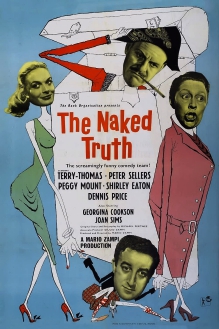The Naked Truth (1957 film)
| The Naked Truth | |
|---|---|
 UK film poster | |
| Directed by | Mario Zampi |
| Written by | Michael Pertwee |
| Produced by | Mario Zampi |
| Starring | |
| Cinematography | Stanley Pavey |
| Edited by | Bill Lewthwaite |
| Music by | Stanley Black |
| Distributed by | J. Arthur Rank Film Distributors |
Release date |
|
Running time | 92 minutes |
| Country | United Kingdom |
| Language | English |
The Naked Truth (U.S. title: Your Past Is Showing [1]) is a 1957 British black comedy film directed and produced by Mario Zampi, starring Terry-Thomas, Peter Sellers and Dennis Price.[2][3] The screenplay was by Michael Pertwee.
In the film, a blackmailer with his own magazine threatens several potential victims. He survives several murder attempts by his victims, but is then arrested and placed on trial for an earlier crime. His victims conspire to break him out of prison and send him into exile before he reveals anything about their respective pasts.
Plot
[edit]Nigel Dennis is a blackmailer who threatens to publish embarrassing secrets in his magazine The Naked Truth. After attempting to blackmail a famous scientist (who commits suicide), and an MP (who suffers a heart attack in parliament, and probably succumbs), his latest targets are Lord Henry Mayley, television host Sonny MacGregor, writer Flora Ransom, and model Melissa Right. Several of them decide independently that murder would be a better solution than paying. However, it is Mayley who by sheer bad luck nearly ends up the victim of both MacGregor and Ransom's schemes. The four eventually join forces and try again. That attempt also fails, but Dennis is then arrested for an earlier crime.
When Dennis threatens to reveal all at his trial, Mayley comes up with a scheme to break him out of prison and send him to South America, with the help of hundreds of his other victims. They phone in numerous fake calls for help, distracting the London police, while Mayley, MacGregor, and MacGregor's reluctant assistant Porter, disguised as policemen, whisk Dennis away.
Knocking Dennis unconscious periodically, they finally end up in the cabin of a blimp on the way to a rendezvous with an outbound ship. To their dismay, when he comes to, Dennis refuses to go along with their plan, as he in fact never wanted to reveal any of their secrets in court. He was, in fact, optimistic about the trial anyway, and reveals that the evidence was his copies of The Naked Truth which had been destroyed by the plotters earlier. Happy to have outsmarted his opponents again, but unaware of where he is, Dennis then steps out for some air and plummets to the ocean below. When MacGregor celebrates by shooting his pistol, it punctures the blimp, which shoots away into the distance.
Cast
[edit]- Terry-Thomas as Lord Henry Mayley
- Peter Sellers as Sonny MacGregor
- Peggy Mount as Flora Ransom
- Shirley Eaton as Melissa Right
- Dennis Price as Nigel Dennis
- Georgina Cookson as Lady Lucy Mayley, Henry's wife
- Joan Sims as Ethel Ransom, Flora's daughter and reluctant accomplice
- Miles Malleson as Reverend Cedric Bastable, Flora's fiancé
- Kenneth Griffith as Porter
- Moultrie Kelsall as Mactavish
- Bill Edwards as Bill Murphy, Melissa's rich Texan boyfriend
- Wally Patch as Fred, paunchy old man
- Henry Hewitt as gunsmith
- John Stuart as police Inspector
- David Lodge as Constable Johnson
- Joan Hurley as authoress
- Peter Noble as television announcer
- Victor Rietti as doctor
- Wilfrid Lawson as TV contestant
- Ronald Adam as chemist
- Michael Ripper as greengrocer
Critical reception
[edit]Allmovie described the film as: "a prescient satire of tabloid journalists and celebrity culture, The Naked Truth, is a well-acted British comedy that doesn't quite succeed in melding its black and broad comedy".[1]
The Radio Times reviewer wrote: "This black comedy supplied Peter Sellers with some of his funniest, and finest, pre-Hollywood material. It's based – as the best British humour often is – on class and sex ... Mario Zampi directs the gags in Michael Pertwee's satisfying script with superb timing."[4]
Leonard Maltin observed: "Sellers (cast as a television star) is a special treat in this amusing satire."[5]
In British Sound Films: The Studio Years 1928–1959 David Quinlan rated the film as "good", writing: "Ealing-style black comedy, full of laughs."[6]
References
[edit]- ^ a b "The Naked Truth (1957) - Mario Zampi - Review - AllMovie". AllMovie.
- ^ "The Naked Truth". British Film Institute Collections Search. Retrieved 24 February 2024.
- ^ "The Naked Truth (1957)". www.bfi.org.uk. Archived from the original on 14 April 2020.
- ^ "The Naked Truth – review - cast and crew, movie star rating and where to watch film on TV and online". Radio Times.
- ^ "Your Past Is Showing (1958) - Overview - TCM.com". Turner Classic Movies.
- ^ Quinlan, David (1984). British Sound Films: The Studio Years 1928–1959. London: B.T. Batsford Ltd. p. 351. ISBN 0-7134-1874-5.
External links
[edit]- 1957 films
- 1957 black comedy films
- British black-and-white films
- British comedy films
- Films directed by Mario Zampi
- Films shot at Pinewood Studios
- Films set in London
- Films set in England
- Films set in Ireland
- 1950s English-language films
- 1950s British films
- Films scored by Stanley Black
- Films about prison escapes
- English-language black comedy films
